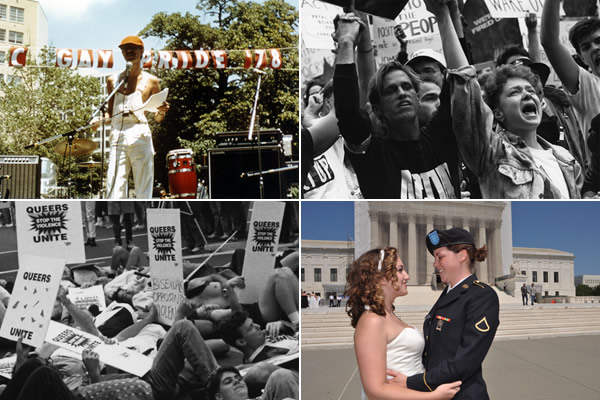a&e features
Top 45 headlines of the Blade’s 45 years
The biggest LGBT stories, from DOMA to ‘Will & Grace’
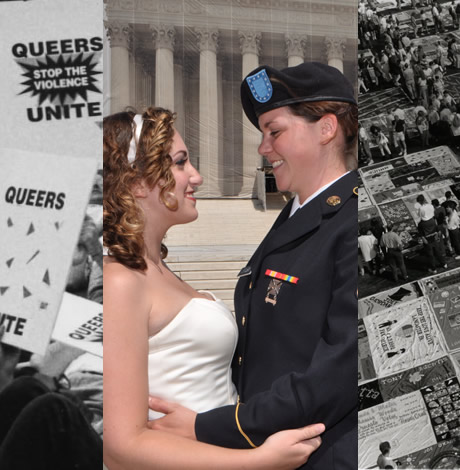
To help commemorate the Blade’s 45th anniversary, the editorial staff worked to identify the top 45 headlines from our archives.
These headlines often represent single events, but sometimes are used thematically to encompass a series of related events. Each one survived several rounds of voting to make the cut and determine its order in the final list.
The stories are a mix of local and national events that helped shape the LGBT movement.
45. 2013: Former Washington Wizards center Jason Collins in April became the first male athlete who actively plays in a major American professional sports league to come out as gay. The watershed announcement prompted other athletes to declare their sexual orientation. These include former University of Missouri defensive end Michael Sam who came out in February and was drafted by the NFL’s Rams.
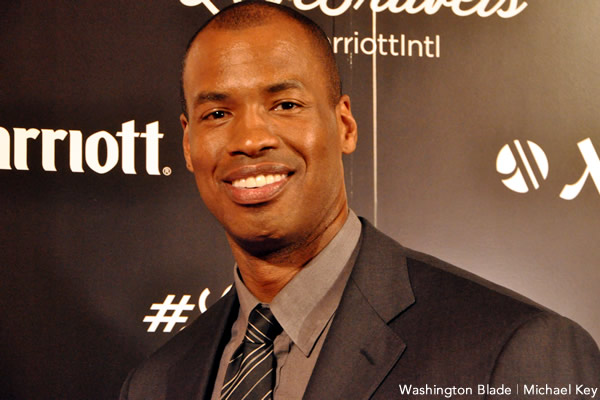
Jason Collins (Washington Blade photo by Michael Key)
44. 1982: An investigation by the Washington Blade reveals that the FBI is spying on D.C. gays. Sources said the FBI and D.C. police were looking into prostitution with adults or minors, the sale and distribution of child pornography and possible infiltration by foreign intelligence agents. The Blade, which interviewed more than 25 people to verify that the investigation was taking place, found that D.C. gay bars, bar owners and some patrons were under surveillance. Spokespeople for the D.C. police and the FBI denied that gays were being singled out for different treatment.
43. 1998: “Will & Grace” debuts in September, marking a significant change in Hollywood’s presentation of LGBT people, their lives and relationships. The sitcom featured Will Truman, a gay lawyer living in New York City, and his straight friend and roommate Grace Adler, an interior designer. Storylines in the comedy involved Will and Grace’s problems seeking romantic relationships as well as struggles in maintaining their own friendship. The most successful TV series featuring gay characters, “Will & Grace” ran for eight years, earned 16 Emmys and made it into the Nielsen Top 20 for half of its network run.
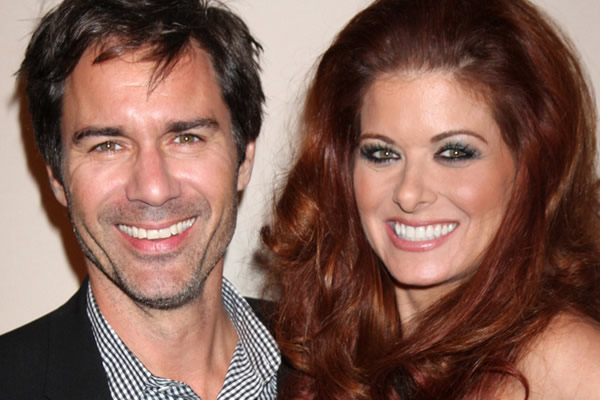
Eric McCormack and Debrah Messing of ‘Will & Grace.’
42. 1992: In October, more than 500,000 people come to see the NAMES Project’s AIDS Memorial Quilt on the National Mall. The 23,000 panels on display covered more than 15 acres around the Washington Monument, and the Quilt included panels from every state and 28 countries. The Quilt was displayed for the first time on the National Mall in 1987, during the National March on Washington for Lesbian & Gay Rights. In January of 1993, the NAMES Project was invited to march in President Clinton’s inaugural parade.
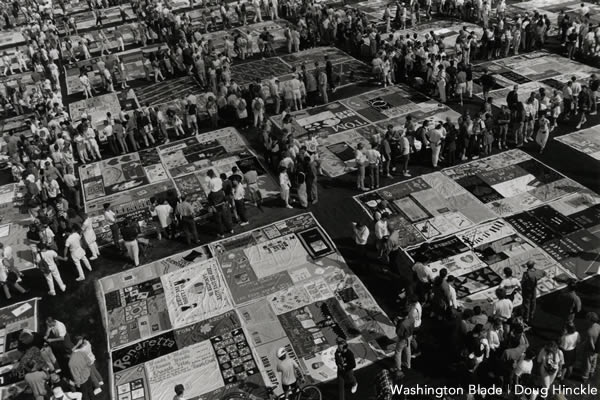
Names Project Quilt on Oct. 10, 1992. (Washington Blade archive photo by Doug Hinckle)
41. 1991: The country’s first Black Gay Pride Day is held in Washington drawing 800 participants. Activists Welmore Cook, Theodore Kirkland and Ernest Hopkins organized the event in response to their concern of supporting the increasing number of HIV-positive black people in the District. The event raised nearly $3,000 for AIDS charities with the support of the D.C. Coalition of Black Lesbians & Gay Men and the Inner City AIDS Network.

Black Gay and Lesbian Pride Day in 1991. (Washington Blade archive photo by Doug Hinckle)
40. 1976: Former nun-turned-gay rights activist Jean O’Leary is elected as the first openly gay delegate to the 1976 Democratic National Convention. O’Leary, who started the Lesbian Feminist Liberation in 1972 and co-founded National Coming Out Day in 1987, was also the organizer of the first meeting of gay rights activists in the White House under President Carter in 1977. O’Leary continued to serve on the Democratic National Committee for 12 years after she became a delegate.
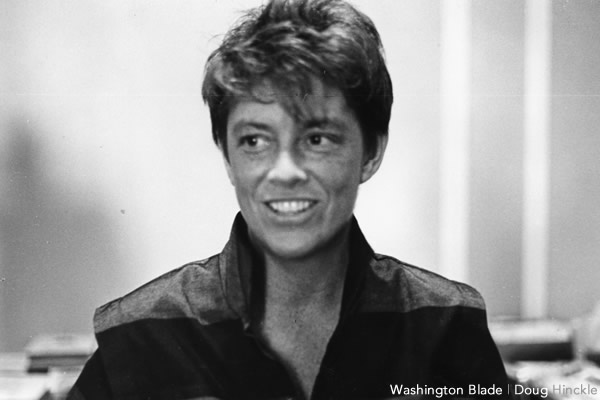
Jean O’Leary (Washington Blade archive photo by Doug Hinckle)
39. 2008: After running a largely gay-friendly campaign, Barack Obama is elected as the nation’s first black president. He frequently pledged during the campaign to seek “equality for all,” vowing to fight for full federal recognition of same-sex couples and develop a comprehensive national HIV/AIDS strategy, among other steps. But in the months following his inauguration, Obama drew criticism from some activists for not doing more to advance LGBT priorities in Congress.
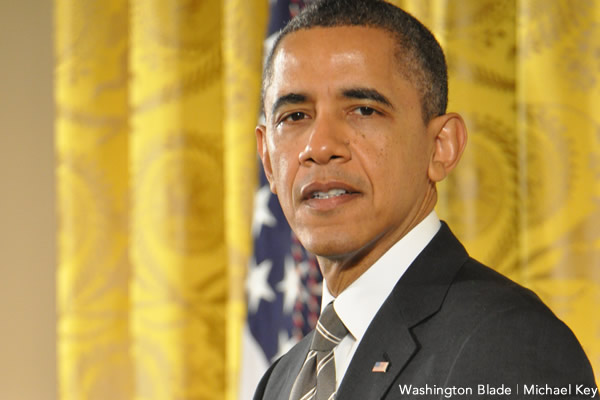
President Barack Obama (Washington Blade file photo by Michael Key).
38. 1973: D.C. Mayor Walter Washington signs into law Title 34, which bans discrimination on the basis of sexual orientation in housing, public accommodations, bank credit and employment. The law also banned discrimination on the basis of marital status and personal appearance. It narrowed the “business necessity” exclusion, which said that businesses would have to prove that practicing nondiscrimination would cost them money and render it impossible to remain in business at all in order to ignore the law.
37. 2011: Franklin E. Kameny, who is credited with playing the lead role in establishing an assertive and credible civil rights movement for lesbians and gays in the early 1960s and who coined the phrase “Gay is Good,” died at his home in Washington, D.C. on Oct. 11 at the age of 86. His voluminous papers chronicling his gay and later LGBT rights work covering the repeal of sodomy laws, allowing gays and lesbians to serve in the military, and the enactment of local and state laws banning LGBT discrimination, among many other efforts, are available for scholars and researchers at the Library of Congress.
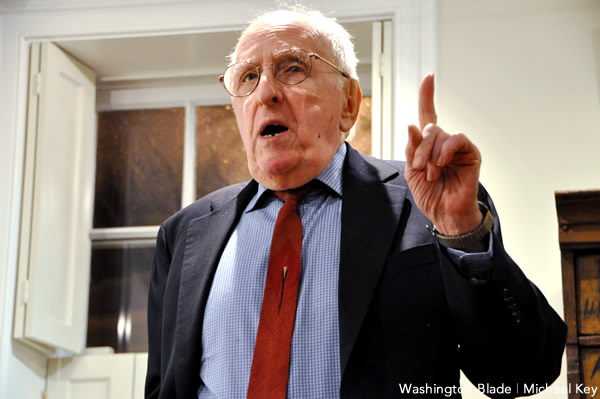
Frank Kameny (Washington Blade file photo by Michael Key)
36. 2004: On Nov. 2, voters in 11 states vote overwhelmingly in support of state constitutional amendments prohibiting same-sex unions. The development came after two other states voted earlier in the year to add constitutional amendments banning gay marriage. President George W. Bush also supported that year the Federal Marriage Amendment, but his endorsement did not rally sufficient support to pass the measure through Congress. The amendment stalled in the U.S. Senate, and was rejected outright in the U.S. House.
35. 1988: About 1,100 AIDS activists, angry at the Food & Drug Administration for taking too long to approve new drugs for people with AIDS, stage a protest at FDA headquarters and close it for the day. Protesters sat or sprawled on the pavement outside the building’s main entrance, preventing employees from entering or leaving. Some demonstrators, who climbed onto an overhanging roof above the building’s main entrance, attached placards and banners proclaiming “silence = death” and “test drugs, not people” to office windows. The demonstration resulted in 176 arrests.
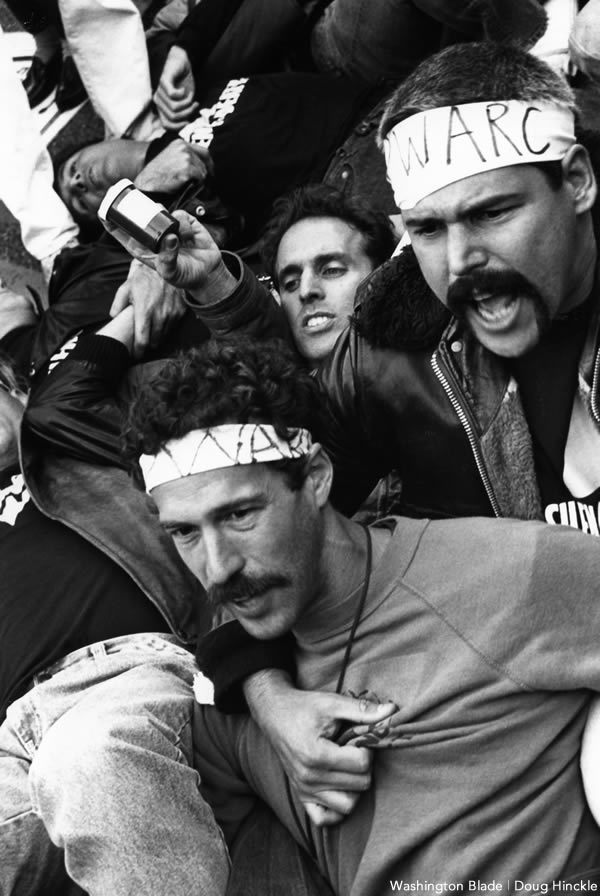
Civil disobedience at the FDA on Oct. 11, 1988. (Washington Blade archive photo by Doug Hinckle)
34. 1987: The Second National March on Washington for Lesbian & Gay Rights draws between 200,000 and 600,000 participants. In addition to demanding civil rights, participants also called on President Ronald Reagan to take greater action to confront the growing AIDS epidemic. The event included the unveiling of Cleve Jones’ NAMES Project AIDS Memorial Quilt and a protest before the Supreme Court building for its 1986 ruling upholding sodomy laws. Speakers included Latino civil rights leader Cesar Chevez; comedian Whoopi Goldberg; and Jesse Jackson, then a Democratic presidential contender.
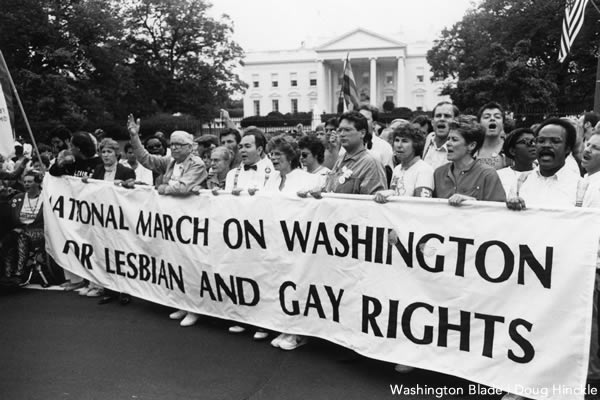
The National March on Washington for Lesbian and Gay Rights on Oct. 14, 1987. (Washington Blade archive photo by Doug Hinckle)
33. 1980: Gay activist Mel Boozer becomes the first openly gay person to have his name placed in nomination as a candidate at the Democratic National Convention. Supporters named Boozer, then a president of the Gay Activists Alliance, as a vice presidential candidate. Boozer, who was black, also addressed the convention during primetime. “I know what it means to be called a ‘nigger’ and I know what it means to be called a ‘faggot,’ and I understand the differences in the marrow of my bones. And I can sum up that difference in one word: none.”
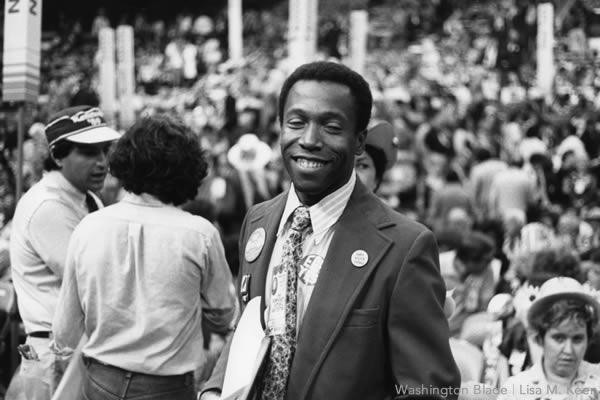
Mel Boozer on the floor of the Democratic National Convention on Aug. 13, 1980. (Washington Blade archive photo by Lisa M. Keen)
32. 1986: The U.S. Supreme Court ruled in Hardwick v. Bowers that homosexual activity is not protected by the Constitution. The court upheld a Georgia sodomy law that criminalized oral and anal sex in private between consenting adults, and said that “majority belief that sodomy is immoral” was sufficient reason to validate sodomy laws. The issue in the case was the right of privacy, and the court ruled that the Constitution’s 14th Amendment right did not extend to private, homosexual conduct.
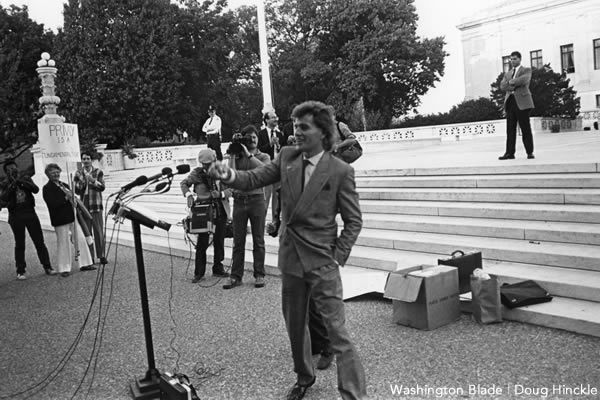
Michael Hardwick in front of the Supreme Court on Oct. 8, 1986. (Washington Blade archive photo by Doug Hinckle)
31. 1983: Gay leaders, independent medical researchers and health and social service agency officials testify before a congressional panel that the federal government’s response to AIDS had been too little, too late. Organizations such as the National Gay Task Force called on the federal government to give substantial funding to AIDS research and create a commission specifically designed to fight the AIDS epidemic. Several witnesses echoed the plea, alleging that the lack of resources had already cost researchers the ability to study the first generation of AIDS cases.
30. 1993: On April 25, the March on Washington for Gay, Lesbian & Bi Equal Rights & Liberation drew an estimated 750,000 participants to Washington. The political rally drew more mainstream media coverage — including a Newsweek cover story — and more participants than previous marches. Protesters also took part in more than 250 march-related events, including conferences, workshops, lobbying events and religious ceremonies.
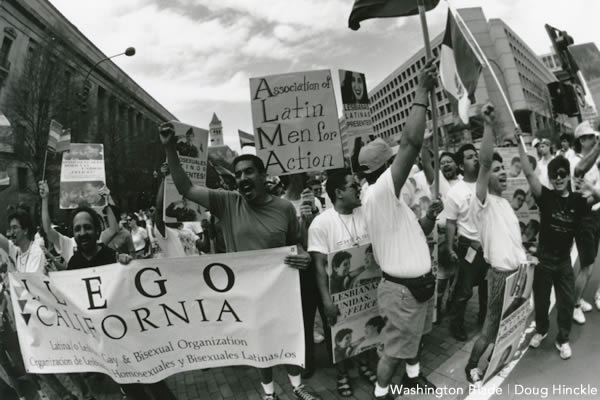
National March on Washington for Lesbian, Gay and Bisexual Rights and Liberation on April 25, 1993. (Washington Blade archive photo by Doug Hinckle)
29. 1982: Wisconsin Gov. Lee Dreyfus signs into law the nation’s first statewide gay civil rights bill, making it illegal in the Badger State to discriminate on the basis of sexual orientation in housing, employment and public accommodations. “There are some questions the government has no business asking,” Dreyfus said of the bill.
28. 2012: U.S. Rep. Tammy Baldwin (D-Wisc.) made history in November when she became the nation’s first out lesbian or gay person to win election to the United States Senate. Her decisive victory over Republican Tommy Thompson, the state’s former governor, solidified Baldwin’s status as a popular and respected public official with strong support from gay and straight voters alike.
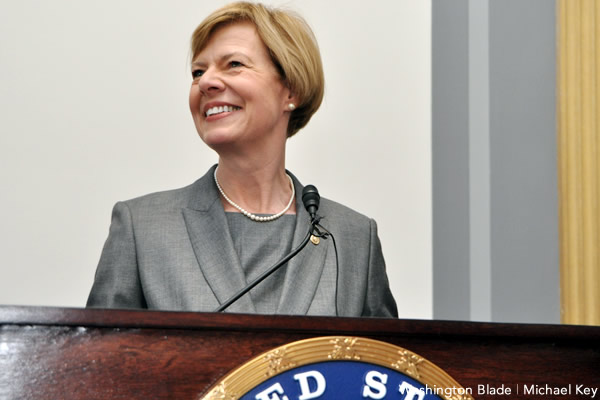
Sen. Tammy Baldwin (D-Wis.) (Washington Blade photo by Michael Key)
27. 1979: On Oct. 14, tens of thousands of people participate in the National March on Washington for Lesbian & Gay Rights. It was the first such march on Washington. Among the many participating groups were the National Gay Task Force, the Gertrude Stein Democratic Club, and the D.C. Area Feminist Alliance. In the days following the march, activists from across the country descended upon Capitol Hill to speak to lawmakers about anti-discrimination laws.
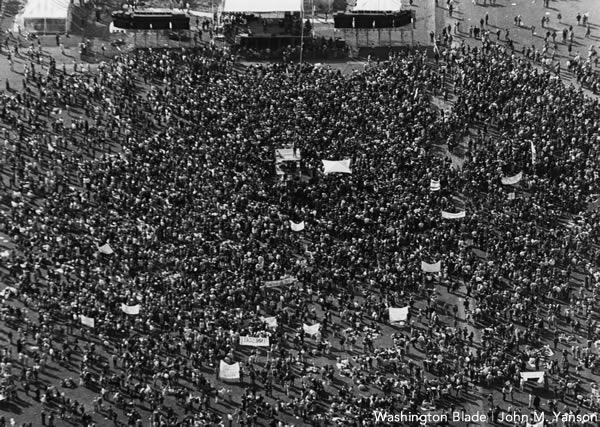
National March on Washington for Lesbian and Gay Rights on Oct. 14, 1979. (Washington Blade archive photo by John M. Yanson)
26. 1985: In late July, actor Rock Hudson issues a statement saying he has AIDS and is receiving treatments in Paris that are unavailable in the U.S. He died three months later at age 59. His announcement and death drew massive mainstream media attention to AIDS, and numerous AIDS fundraisers ensued to help fund research, treatment and services for people with AIDS. Actress Elizabeth Taylor, a friend of Hudson’s, went on to start an AIDS fundraising organization, the American Foundation for AIDS Research.
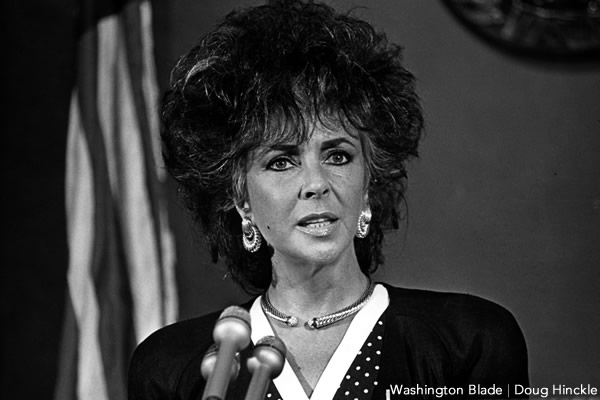
Elizabeth Taylor (Washington Blade archive photo by Doug Hinckle)
25. 1997: Actress Ellen DeGeneres comes out in an article in the April 17 issue of Time magazine. The headline: “Yep, I’m Gay.” Her alter ego, Ellen Morgan, also came out in the April 30 episode of “Ellen,” becoming the first gay lead character on television. The hour-long episode featured Laura Dern as Ellen’s romantic interest; Oprah Winfrey played a therapist who assured Ellen that there’s nothing wrong with being gay.
24. 2007: A debate raged among LGBT activists over how to best advance LGBT rights after the U.S. House of Representatives passed an Employment Non-Discrimination Act that lacked explicit protections for transgender people. Rep.Tammy Baldwin (D-Wis.), a lesbian, introduced an amendment to add a trans provision to the bill, but withdrew it before a vote. Her move was considered a symbolic gesture to assure trans people they were not forgotten. The bill passed the House, 235-184, but after President Bush threatened a veto, the Senate failed to take up the measure.
23. 2012: The American Psychiatric Association on Dec. 2, removed Gender Identity Disorder from its list of mental disorders. The organization specifically removed GID from its Diagnostic and Statistical Manuel (DSM) of Mental Disorders and replaced it with Gender Dysphoria. The process to revise the DSM began more than a decade earlier.
22. 2009: Throughout the year, more same-sex couples win the right to marry. The Iowa Supreme Court unanimously strikes down the state’s ban on same-sex marriage; Vermont becomes the first state to legalize same-sex marriage via the legislative path after it overrides Gov. Jim Douglas’s veto; Maine lawmakers followed, with Gov. John Baldacci signing the bill; and New Hampshire becomes the sixth state to legalize same-sex marriage.
21. 2013: More states begin to legalize same-sex marriage in the aftermath of the Supreme Court’s decision striking down DOMA. Marriage laws in Rhode Island and Hawaii took effect on Aug. 1, 2013, and Dec. 2, 2013, respectively. Illinois’ same-sex marriage law took effect statewide on June 1. Gays and lesbians also gained marriage rights in New Mexico, Oregon and Pennsylvania since the DOMA decision.
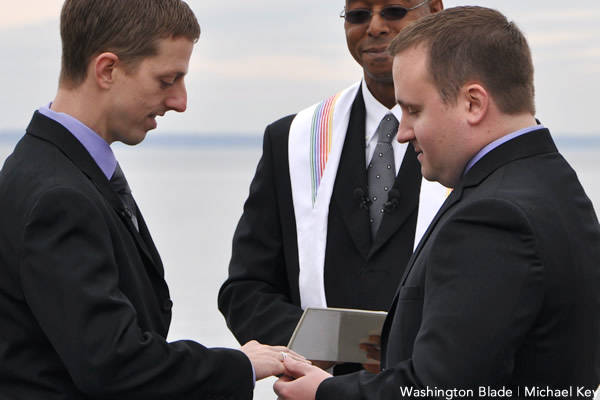
(Washington Blade file photo by Michael Key)
20. 1996: At the 1996 International Conference on AIDS in Vancouver, it’s announced that HIV/AIDS cocktails, three-drug combinations used to combat the disease, held promise in combating symptoms. The introduction of the cocktails fundamentally changed the way AIDS was perceived, shifting it away from an inevitably fatal disease to one that, while chronic, was more manageable. The cocktails showed promise in blood tests of people with access to the drugs even though the number of available cocktails was limited at the time.
19. 1982: Gay Related Immune Disorder, or GRID, becomes the first name to describe what now is known as AIDS. Cases reached epidemic proportions, moving beyond clusters of gay men in New York and San Francisco and into groups with no obvious risk factors. Scientists later agreed that Acquired Immune Deficiency Syndrome more accurately described the disease, which did not exclusively affect gay men. In 1984, government researchers identify what they believe is the “probable cause” of AIDS: HTLVIII, the Human T-cell Leukemia Virus. In June 1988, the Presidential Commission on the Human Immunodeficiency Virus Epidemic, a 13-member panel, released a comprehensive report of 583 recommendations to address the AIDS epidemic.
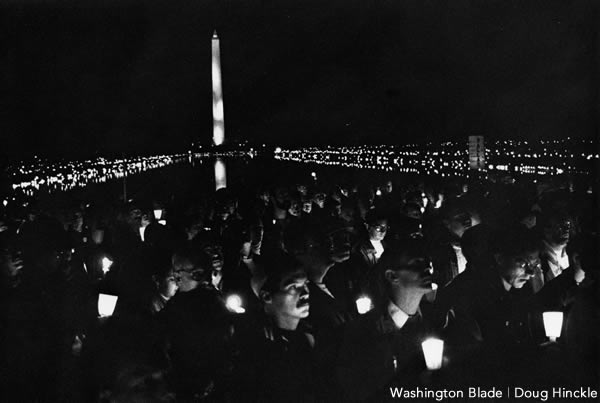
(Washington Blade archive photo by Doug Hinckle)
18. 1993: President Clinton angers gays across the country when he backs off his campaign promise to end the ban on gays in the military, instead endorsing a policy by Sen. Sam Nunn (D-Ga.). Supporters touted the law — which became known as “Don’t Ask, Don’t Tell” — as a compromise because it would allow gays to serve in the military provided that they didn’t disclose their sexual orientation. Under the policy, about 13,000 service members were discharged, some because their sexual orientation was disclosed by others to commanding officers.
17. 1996: The Defense of Marriage Act abruptly surfaces in May before quickly working its way through Congress and winning President Clinton’s signature in September. The law prohibits the federal government from recognizing same-sex marriage, and allows states not to recognize same-sex unions performed in other states. Same-sex marriage was not legal anywhere in the U.S. when Clinton signed DOMA into law, but now marriage rights for gay couples are available in six states. Because of DOMA, legally married same-sex couples in these states aren’t eligible for federal benefits.
16. 1970: A crowd of 2,000 gay demonstrators in New York commemorates the first anniversary of the Stonewall Riots with a march and rally. The event, known as Christopher Street Liberation Day, occurred June 28 and reportedly took up about 15 blocks of the street. The New York Times reported there was little animosity, and “some bystanders applauded when a tall, pretty girl carrying a sign ‘I am a Lesbian’ walked by.” Pride marches took place simultaneously in Los Angeles and Chicago.
15. 2009: Mayor Adrian Fenty on Dec. 18 signed a bill approved days earlier by the D.C. City Council in an 11-2 vote legalizing same-sex marriage in the nation’s capital. The legislation successfully cleared a required legislative review by Congress and withstood efforts by opponents who attempted unsuccessfully to require that it come before voters in a referendum. The Religious Freedom and Civil Marriage Equality Amendment Act of 2009 took effect March 3, 2010.
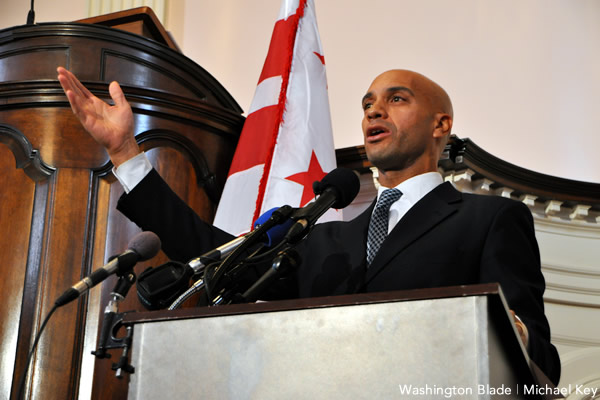
Mayor Adrian Fenty at the same-sex marriage bill signing. (Washington Blade photo by Michael Key)
14. 2012: Same-sex marriage laws were upheld at the ballot box for the first time. Voters in Maryland, Maine and Washington on Nov. 6 backed gay nuptials statutes in their respective states. Minnesotans on the same day rejected a proposed state constitutional amendment that would have defined marriage as between a man and a woman.
13. 2008: In May, a California Supreme Court ruling legalizes same-sex marriage in the state. Later that year, the Connecticut Supreme Court rules similarly. A ballot initiative to overturn the California ruling was put to voters on Election Day in November. Following an expensive campaign funded largely by the Mormon Church and anti-gay groups such as Focus on the Family, California voters passed Proposition 8, which rescinded same-sex marriage rights in the state.
12. 1977: In June, singer Anita Bryant leads a highly publicized campaign to repeal a gay civil rights ordinance in Dade County, Florida. The ordinance made it illegal to discriminate on the basis of sexual orientation in housing, employment, loans and public accommodations. Bryant founded Save Our Children to protest the ordinance and she led several more campaigns around the country to repeal other local anti discrimination ordinances. A boycott was organized against the Florida Citrus Commission, who used Bryant in advertising. Bryant’s campaign in Dade County was overturned in 1998.
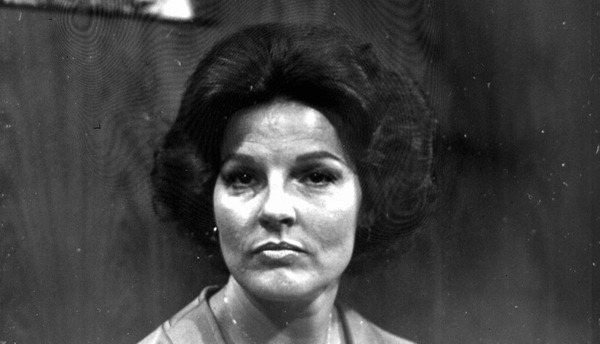
Anita Bryant (Photo public domain)
11. 1974: U.S. Reps. Bella Abzug and Edward Koch, Democrats from New York, introduce the Equality Act of 1974.The bill would have added “sexual orientation” to the 1964 U.S. Civil Rights Act, making it illegal to discriminate against gays and lesbians in employment, housing and public accommodations. The Equality Act, the first federal legislation in support of gay rights, never passed.
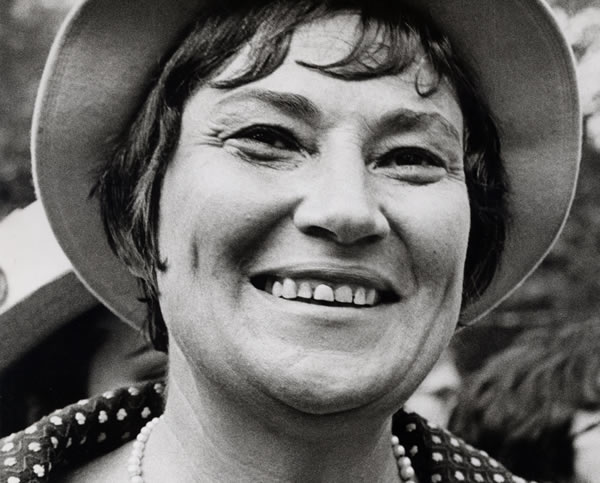
Rep. Bella Abzug (D-N.Y.) (Photo public domain)
10. 2009: Eleven years after the murder of the gay college youth for whom the bill was partly named, President Obama signed into law the Matthew Shepard & James Byrd, Jr. Hate Crimes Prevention Act. It was the first time federal protections for the LGBT community were enshrined into U.S. code. Byrd, a black man, was dragged to death behind a truck in 1998 by three white men in Texas.
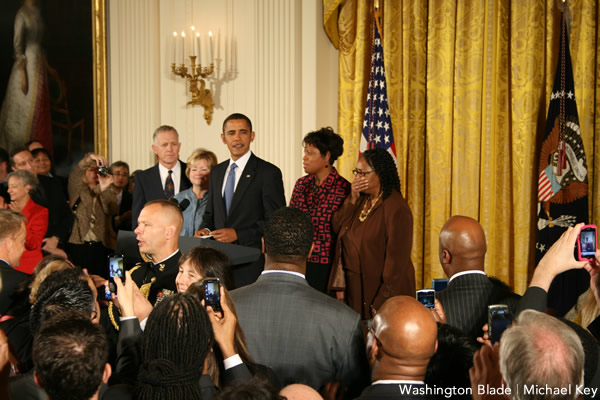
Signing of the Matthew Shepard and James Byrd Hate Crimes Prevention Act in 2009. (Washington Blade photo by Michael Key)
9. 1998: Matthew Shepard, a gay college student, is tortured and left to die near Laramie, Wyo., in October. He was found tied to a fence and was brought to a hospital, where he later died. The killers were sentenced in April 1999 and November 1999 to life in prison. Grief following his death led to the introduction of federal legislation that would enable the Justice Department to prosecute hate crimes against LGBT people. The bill languished in Congress for years before becoming law (see number 10).
8. 2010: After nearly two years of struggles in Congress, President Obama signed legislation known as the “Don’t Ask, Don’t Tell” Repeal Act to lift the U.S. military’s ban on openly gay service. The armed forces discharged more than 13,000 service members under the law before it was formally lifted one year later.
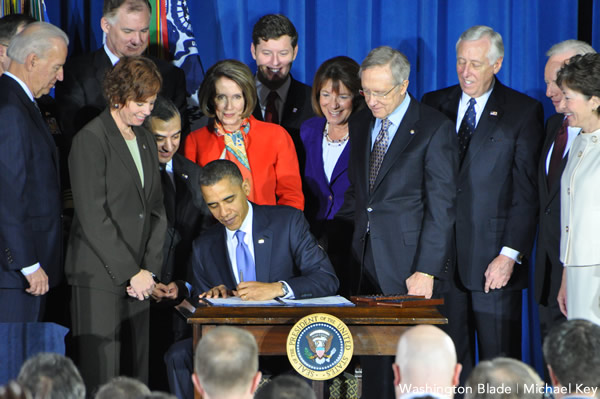
President Obama signed the repeal of ‘Don’t Ask, Don’t Tell’ in December 2010, but it didn’t take effect until September 2011. (Washington Blade photo by Michael Key)
7. 2003: On June 26, the U.S. Supreme Court rules in Lawrence v. Texas that sodomy laws are unconstitutional. In 1998, John Lawrence and Tyron Garner were arrested in Lawrence’s Houston home and jailed overnight after officers responding to a disturbance report found the men having sex. The court voted 6-3 to strike down the law, and the opinion covered similar laws in 12 other states. With its decision, the court also reversed Bowers v. Hardwick, its 1986 decision that upheld Georgia’s sodomy law on the argument that it had been harmful to gay people’s struggles for liberty and equality.
6. 2012: Ending the evolution he started 18 months earlier, President Obama announced during a TV interview with then-closeted ABC anchor Robin Roberts that he supports marriage rights for same-sex couples. Obama made history by winning re-election just six months after taking that position in a race against Mitt Romney, who remained opposed to marriage equality.
5. 1978: San Francisco City Supervisor Harvey Milk is gunned down by Supervisor Dan White, who also shoots and kills Mayor George Moscone. Milk, who was gay and a pioneer for LGBT rights, in 1978 helped to defeat the Briggs Initiative, which would have prevented gays from working as teachers in California. On the day of his assassination, U.S. Sen. Dianne Feinstein, then the president of the Board of Supervisors, heard gunshots and called police, found Milk’s body and announced the news to the media. A candlelight vigil to the City Hall of between 25,000 and 40,000 marchers followed the assassination. More than 2,000 angry gay demonstrators protested the 1979 sentence of voluntary manslaughter of Dan White on May 21.

Harvey Milk (Photo by Daniel Nicoletta; courtesy Wikimedia Commons)
4. 1981: It is reported that an estimated 170 gay men have succumbed to a rare pneumocystis carinii pneumonia and Kaposi’s sarcoma over the preceding two years. The U.S. Centers for Disease Control issued reports on three studies that cited a serious malfunctioning of the body’s immune systems in these cases. By December, 43 percent of those infected with either pneumocystis or Kaposi’s had died. The reports were the nation’s first indication of the coming HIV/AIDS epidemic.
3. 2003: The Massachusetts Supreme Court rules in November that same-sex marriage is legal, making the Bay State the first in the country to grant marriage rights to gay couples. In its ruling for the case, known as Goodrich v. Department of Public Health, the court specified state law prohibited gays from marrying and gave state lawmakers 180 days to take appropriate action to address the issue. Then-Gov. Mitt Romney ordered town clerks to begin issuing marriage licenses to same-sex couples.
2. 1973: The American Psychiatric Association in December resolves that homosexuality should no longer be considered a mental disorder. Officials rendered the decision after intense lobbying from gays, including veteran activist Frank Kameny, as well as an endorsement from all 68 district branches of the APA. The new resolution — adopted by 13 members of the APA Board of Trustees with two remaining members abstaining — called for an end to discrimination and repeal of sodomy laws throughout the country. The National Gay Task Force at the time called the decision “an instant cure.”
1. 2013 & 2014: The U.S. Supreme Court issued its most historic rulings on LGBT rights to date. First, in 2013, by striking down Section 3 of the Defense of Marriage Act and issuing a decision restoring marriage equality to California after passage of Proposition 8. Same-sex marriage returned to the largest state in the nation, and for the first time, federal benefits began to flow to married same-sex couples. Then, just this week, the court declined to hear marriage cases from five states, instantly bringing marriage equality to Virginia, Utah, Oklahoma, Indiana and Wisconsin.
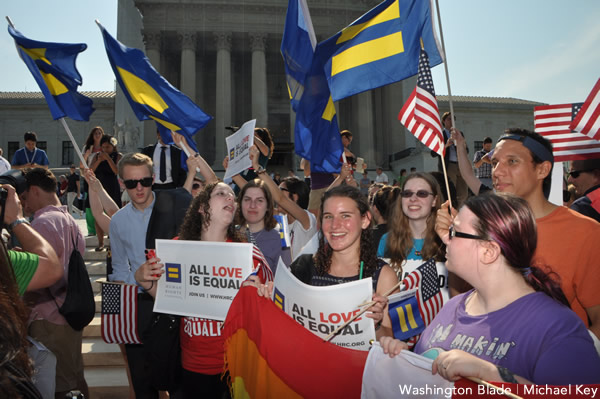
(Washington Blade file photo by Michael Key)
a&e features
What to expect at the 2024 National Cannabis Festival
Wu-Tang Clan to perform; policy discussions also planned

(Editor’s note: Tickets are still available for the National Cannabis Festival, with prices starting at $55 for one-day general admission on Friday through $190 for a two-day pass with early-entry access. The Washington Blade, one of the event’s sponsors, will host a LGBTQIA+ Lounge and moderate a panel discussion on Saturday with the Mayor’s Office of LGBTQ Affairs.)
With two full days of events and programs along with performances by Wu-Tang Clan, Redman, and Thundercat, the 2024 National Cannabis Festival will be bigger than ever this year.
Leading up to the festivities on Friday and Saturday at Washington, D.C.’s RFK Stadium are plenty of can’t-miss experiences planned for 420 Week, including the National Cannabis Policy Summit and an LGBTQ happy hour hosted by the District’s Black-owned queer bar, Thurst Lounge (both happening on Wednesday).
On Tuesday, the Blade caught up with NCF Founder and Executive Producer Caroline Phillips, principal at The High Street PR & Events, for a discussion about the event’s history and the pivotal political moment for cannabis legalization and drug policy reform both locally and nationally. Phillips also shared her thoughts about the role of LGBTQ activists in these movements and the through-line connecting issues of freedom and bodily autonomy.
After D.C. residents voted to approve Initiative 71 in the fall of 2014, she said, adults were permitted to share cannabis and grow the plant at home, while possession was decriminalized with the hope and expectation that fewer people would be incarcerated.
“When that happened, there was also an influx of really high-priced conferences that promised to connect people to big business opportunities so they could make millions in what they were calling the ‘green rush,'” Phillips said.
“At the time, I was working for Human Rights First,” a nonprofit that was, and is, engaged in “a lot of issues to do with world refugees and immigration in the United States” — so, “it was really interesting to me to see the overlap between drug policy reform and some of these other issues that I was working on,” Phillips said.
“And then it rubbed me a little bit the wrong way to hear about the ‘green rush’ before we’d heard about criminal justice reform around cannabis and before we’d heard about people being let out of jail for cannabis offenses.”
“As my interests grew, I realized that there was really a need for this conversation to happen in a larger way that allowed the larger community, the broader community, to learn about not just cannabis legalization, but to understand how it connects to our criminal justice system, to understand how it can really stimulate and benefit our economy, and to understand how it can become a wellness tool for so many people,” Phillips said.
“On top of all of that, as a minority in the cannabis space, it was important to me that this event and my work in the cannabis industry really amplified how we could create space for Black and Brown people to be stakeholders in this economy in a meaningful way.”

“Since I was already working in event production, I decided to use those skills and apply them to creating a cannabis event,” she said. “And in order to create an event that I thought could really give back to our community with ticket prices low enough for people to actually be able to attend, I thought a large-scale event would be good — and thus was born the cannabis festival.”
D.C. to see more regulated cannabis businesses ‘very soon’
Phillips said she believes decriminalization in D.C. has decreased the number of cannabis-related arrests in the city, but she noted arrests have, nevertheless, continued to disproportionately impact Black and Brown people.
“We’re at a really interesting crossroads for our city and for our cannabis community,” she said. In the eight years since Initiative 71 was passed, “We’ve had our licensed regulated cannabis dispensaries and cultivators who’ve been existing in a very red tape-heavy environment, a very tax heavy environment, and then we have the unregulated cannabis cultivators and cannabis dispensaries in the city” who operate via a “loophole” in the law “that allows the sharing of cannabis between adults who are over the age of 21.”
Many of the purveyors in the latter group, Phillips said, “are looking at trying to get into the legal space; so they’re trying to become regulated businesses in Washington, D.C.”
She noted the city will be “releasing 30 or so licenses in the next couple of weeks, and those stores should be coming online very soon” which will mean “you’ll be seeing a lot more of the regulated stores popping up in neighborhoods and hopefully a lot more opportunity for folks that are interested in leaving the unregulated space to be able to join the regulated marketplace.”
National push for de-scheduling cannabis
Signaling the political momentum for reforming cannabis and criminal justice laws, Wednesday’s Policy Summit will feature U.S. Sens. Raphael Warnock (D-Ga.), Jeff Merkley (D-Ore.), Elizabeth Warren (D-Mass.), and Chuck Schumer (D-N.Y.), the Senate majority leader.
Also representing Capitol Hill at the Summit will be U.S. Congresswoman Eleanor Holmes Norton (D-D.C.) and U.S. Reps. Earl Blumenauer (D-Ore.) and Barbara Lee (D-Calif.) — who will be receiving the Supernova Women Cannabis Champion Lifetime Achievement Award — along with an aide to U.S. Rep. David Joyce (R-Ohio).
Nationally, Phillips said much of the conversation around cannabis concerns de-scheduling. Even though 40 states and D.C. have legalized the drug for recreational and/or medical use, marijuana has been classified as a Schedule I substance since the Controlled Substances Act was passed in 1971, which means it carries the heftiest restrictions on, and penalties for, its possession, sale, distribution, and cultivation.
The U.S. Department of Health and Human Services formally requested the drug be reclassified as a Schedule III substance in August, which inaugurated an ongoing review, and in January a group of 12 Senate Democrats sent a letter to the Biden-Harris administration’s Drug Enforcement Administration urging the agency to de-schedule cannabis altogether.
Along with the Summit, Phillips noted that “a large contingent of advocates will be coming to Washington, D.C. this week to host a vigil at the White House and to be at the festival educating people” about these issues. She said NCF is working with the 420 Unity Coalition to push Congress and the Biden-Harris administration to “move straight to de-scheduling cannabis.”
“This would allow folks who have been locked up for cannabis offenses the chance to be released,” she said. “It would also allow medical patients greater access. It would also allow business owners the chance to exist without the specter of the federal government coming in and telling them what they’re doing is wrong and that they’re criminals.”
Phillips added, however, that de-scheduling cannabis will not “suddenly erase” the “generations and generations of systemic racism” in America’s financial institutions, business marketplace, and criminal justice system, nor the consequences that has wrought on Black and Brown communities.
An example of the work that remains, she said, is making sure “that all people are treated fairly by financial institutions so that they can get the funding for their businesses” to, hopefully, create not just another industry, but “really a better industry” that from the outset is focused on “equity” and “access.”
Policy wonks should be sure to visit the festival, too. “We have a really terrific lineup in our policy pavilion,” Phillips said. “A lot of our heavy hitters from our advocacy committee will be presenting programming.”
“On Saturday there is a really strong federal marijuana reform panel that is being led by Maritza Perez Medina from the Drug Policy Alliance,” she said. “So that’s going to be a terrific discussion” that will also feature “representation from the Veterans Cannabis Coalition.”
“We also have a really interesting talk being led by the Law Enforcement Action Partnership about conservatives, cops, and cannabis,” Phillips added.
Cannabis and the LGBTQ community
“I think what’s so interesting about LGBTQIA+ culture and the cannabis community are the parallels that we’ve seen in the movements towards legalization,” Phillips said.
The fight for LGBTQ rights over the years has often involved centering personal stories and personal experiences, she said. “And that really, I think, began to resonate, the more that we talked about it openly in society; the more it was something that we started to see on television; the more it became a topic in youth development and making sure that we’re raising healthy children.”
Likewise, Phillips said, “we’ve seen cannabis become more of a conversation in mainstream culture. We’ve heard the stories of people who’ve had veterans in their families that have used cannabis instead of pharmaceuticals, the friends or family members who’ve had cancer that have turned to CBD or THC so they could sleep, so they could eat so they could get some level of relief.”
Stories about cannabis have also included accounts of folks who were “arrested when they were young” or “the family member who’s still locked up,” she said, just as stories about LGBTQ people have often involved unjust and unnecessary suffering.
Not only are there similarities in the socio-political struggles, Phillips said, but LGBTQ people have played a central role pushing for cannabis legalization and, in fact, in ushering in the movement by “advocating for HIV patients in California to be able to access cannabis’s medicine.”
As a result of the queer community’s involvement, she said, “the foundation of cannabis legalization is truly patient access and criminal justice reform.”
“LGBTQIA+ advocates and cannabis advocates have managed to rein in support of the majority of Americans for the issues that they find important,” Phillips said, even if, unfortunately, other movements for bodily autonomy like those concerning issues of reproductive justice “don’t see that same support.”
a&e features
Juliet Hawkins’s music defies conventional categorization
‘Keep an open mind, an open heart, and a willingness to evolve’
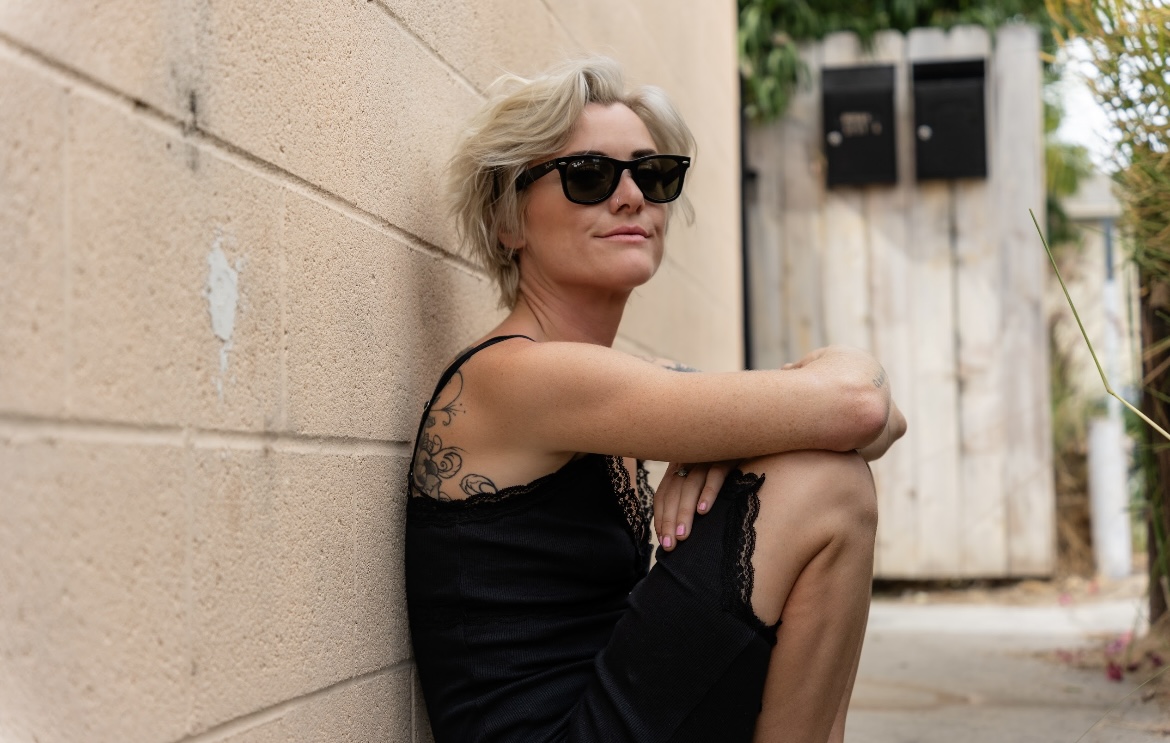
LONG BEACH, Calif. – Emerging from the dynamic music scene of Los Angeles, Juliet Hawkins seamlessly integrates deeply soulful vocals with contemporary production techniques, crafting a distinctive sound that defies conventional categorization.
Drawing inspiration from the emotive depth of Amy Winehouse and weaving together elements of country, blues, and pop, Hawkins’ music can best be described as a fusion–perhaps best termed as soulful electronica. Yet, even this characterization falls short, as Hawkins defines herself as “a blend of a million different inspirations.”
Hawkins’s musical palette mirrors her personae: versatile and eclectic. Any conversation with Hawkins makes this point abundantly clear. She exhibits the archetype of a wild, musical genius while remaining true to her nature-loving, creative spirit. Whether recording in the studio for an album release, performing live in a studio setting, or playing in front of a live audience, Hawkins delivers her music with natural grace.
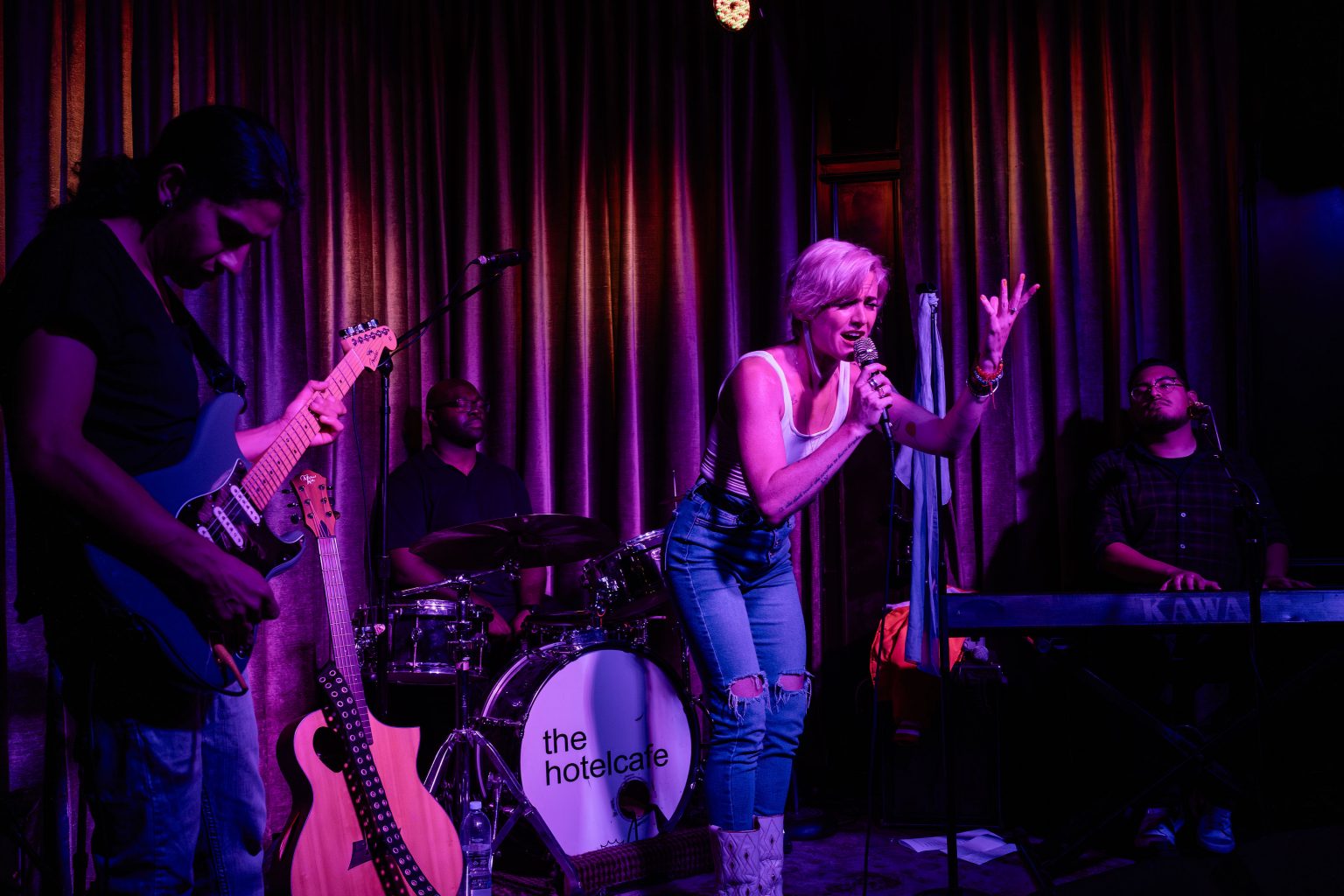
However, Hawkins’s musical journey is far from effortless. Amid personal challenges and adversity, she weaves her personal odyssey of pain and pleasure, transforming these experiences into empowering anthems.
In a candid interview with the Blade, Hawkins spoke with profound openness and vulnerability about her past struggles with opiate and heroin addiction: “That was 10 years ago that I struggled with opiates,” she shared. Yet, instead of letting her previous addiction define her, Hawkins expressed to the Blade that she harbors no shame about her past. “My newer music is much more about empowerment than recovery,” she explained, emphasizing that “writing was the best way to process trauma.”
Despite her struggles with addiction, Hawkins managed to recover. However, she emphasizes that this recovery is deeply intertwined with her spiritual connection to nature. An illustrative instance of Hawkins’ engagement with nature occurred during the COVID pandemic.
Following an impulse that many of us have entertained, she bought a van and chose to live amidst the trees. It was during this period that Hawkins composed the music for her second EP, titled “Lead with Love.”
In many ways, Hawkins deep spiritual connection to nature has been profoundly shaped by her extensive travels. Born in San Diego, spending her formative years in Massachusetts, and later moving to Tennessee before returning to Southern California, she has broadened her interests and exposed herself to the diverse musical landscapes across America.
“Music is the only thing I have left,” Hawkins confides to the Blade, highlighting the integral role that music has in her life. This intimate relationship with music is evident in her sultry and dynamic compositions. Rather than imitating or copying other artists, Hawkins effortlessly integrates sounds from some of her favorite musical influences to create something new. Some of these influences include LP, Lucinda Williams, Lana Del Rey, and, of course, Amy Winehouse, among others.

Hawkins has always been passionate about music—-she began with piano at a young age, progressed to guitar, and then to bass, eagerly exploring any instrument she could get her hands on. However, instead of following a traditional path of formalized lessons and structured music theory, Hawkins told the Blade that she “has a hard time following directions and being told what to do.”
This independent approach has led her to experiment with various genres and even join unexpected groups, such as a tribute band for Eric Clapton and Cream. While she acknowledges that her eclectic musical interests might be attributed to ADHD, she holds a different belief: “Creative minds like to move around.”
When discussing her latest musical release — “Stay True (the live album)” which was recorded in a live studio setting — Hawkins describes the experience as a form of improvisation with both herself and the band:
“[The experience] was this divine honey that was flowing through all of us.” She explains that this live album was uncertain in the music’s direction. “For a couple of songs,” Hawkins recalls, “we intuitively closed them out.” By embracing creative spontaneity and refusing to be constrained by fear of mistakes, the live album authentically captures raw sound, complete with background chatter, extended outros, and an extremely somber cover of Ozzy Osbourne’s “Crazy Train” coupled with a slow piano and accompanied strings.
While “Stay True” was a rewarding experience for Hawkins, her favorite live performance took place in an unexpected location—an unattended piano in the middle of an airport. As she began playing Beethoven’s “Moonlight Sonata”, Hawkins shared with the Blade a universal connection we all share with music: “This little girl was dancing as I was playing.”
After the performance, tears welled in Hawkins’ eyes as she was touched by the young girl’s appreciation of her musicianship. Hawkins tells the Blade, “It’s not about playing to an audience—it’s about finding your people.”
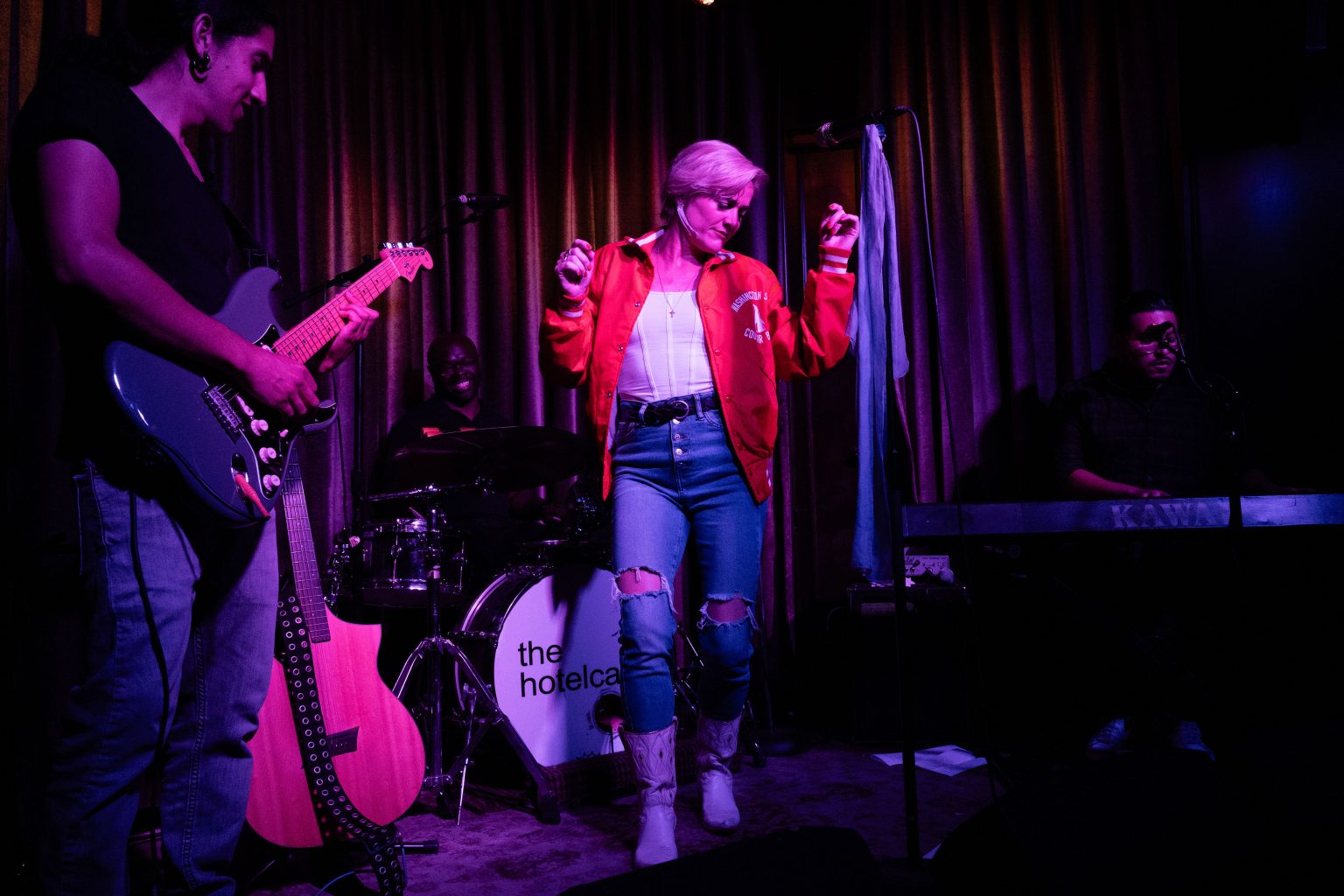
What sets Hawkins apart as an artist is her ability to connect with her audience in diverse settings. She highlights EDC, an electronic dance music festival, as a place where she unabashedly lets her “freak flag” fly and a place to connect with her people. Her affinity for electronic music not only fuels her original pop music creations, but also inspires her to reinterpret songs with an electronic twist. A prime example of this is with her electronic-style cover of Tal Bachman’s 90’s hit, “She’s So High.”
As an openly queer woman in the music industry, Hawkins is on a mission to safeguard artistic integrity. In songs like “My Father’s Men,” she bares her vulnerability and highlights the industry’s misogyny, which often marginalizes gender minorities in their pursuit of artistic expression.
She confides to the Blade, “The industry can be so sexist, misogynist, and oppressive,” and points out that “there are predators in the industry.” Yet, rather than succumbing to apathy, Hawkins is committed to advocating for gender minorities within the music industry.
“Luckily, people are rising up against misogyny, but it’s still there. ‘My Father’s Men’ is a message: It’s time for more people who aren’t just white straight men to have a say.”
Hawkins is also an activist for other causes, with a fervent belief in the preservation of bodily autonomy. Her self-directed music video “I’ll play Daddy,” showcases the joy of embracing one’s body with Hawkins being sensually touched by a plethora of hands. While the song, according to Hawkins, “fell upon deaf ears in the south,” it hasn’t stopped Hawkins from continuing to fight for the causes she believes in. In her interview, Hawkins encapsulated her political stance by quoting an artist she admires:
“To quote Pink, ‘I don’t care about your politics, I care about your kids.’”
When Hawkins isn’t writing music or being a champion for various causes, you might catch her doing the following: camping, rollerblading, painting, teaching music lessons, relaxing with Bernie (her beloved dog), stripping down for artsy photoshoots, or embarking on a quest to find the world’s best hollandaise sauce.
But at the end of the day, Hawkins sums up her main purpose: “To come together with like-minded people and create.”
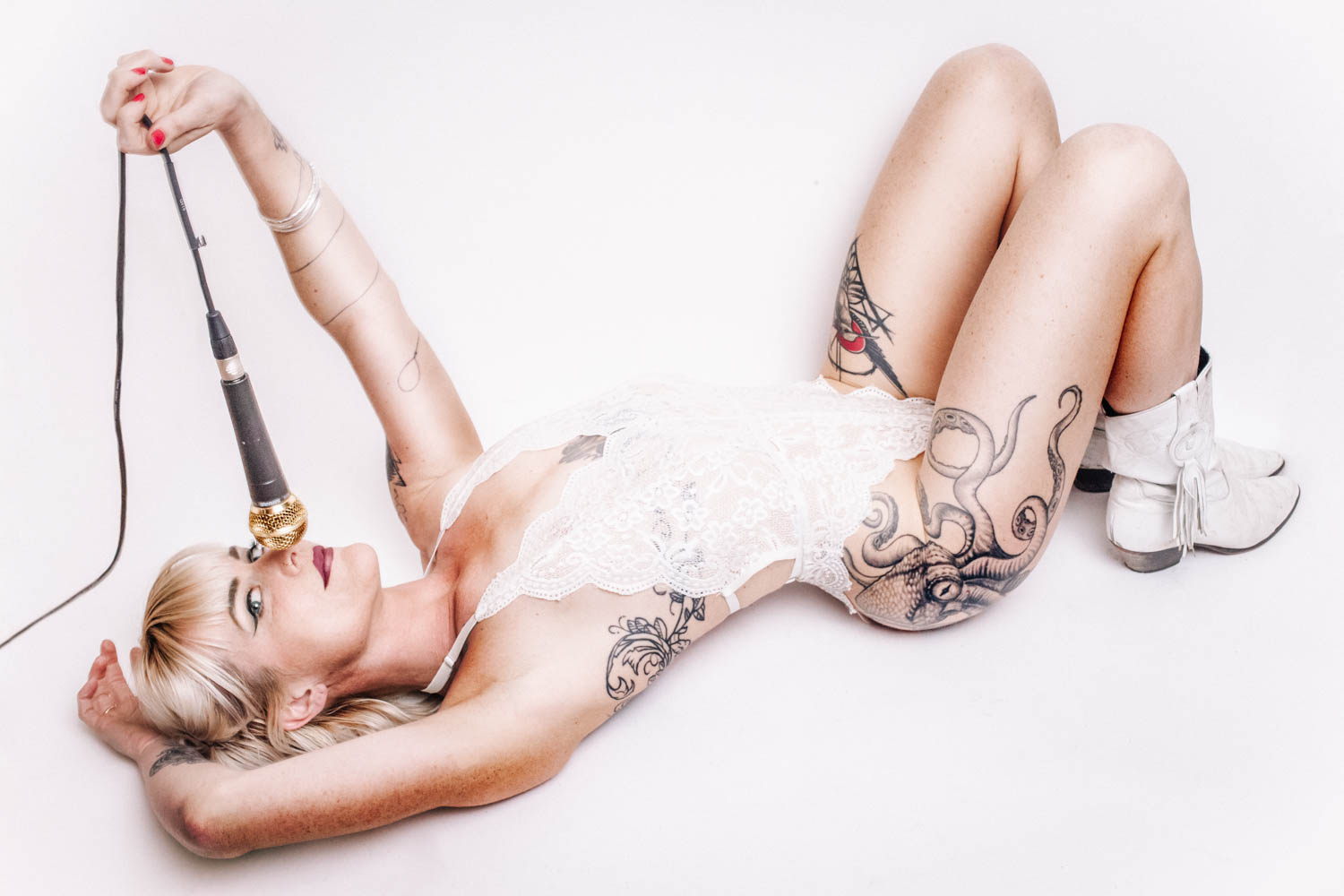
Part of this ever-evolving, coming-of-age-like journey includes an important element: plant-based medicine. Hawkins tells the Blade that she acknowledges her previous experience with addiction and finds certain plants to be useful in her recovery:
“The recovery thing is tricky,” Hawkins explains, “I don’t use opiates—-no powders and no pills—but I am a fan of weed, and I think psilocybin can be helpful when used at the right time.” She emphasizes the role of psychedelics in guiding her towards her purpose. “Thanks for psychedelics, I have a reignited sense of purpose … Music came naturally to me as an outlet to heal.”
While she views the occasional dabbling of psychedelics as a spiritual practice, Hawkins also embraces other rituals, particularly those she performs before and during live shows. “I always carry two rocks with me: a labradorite and a tiger’s eye marble,” she explains.
a&e features
Lavender Mass and the art of serious parody in protest
Part 3 of our series on the history of LGBTQ religion in D.C.
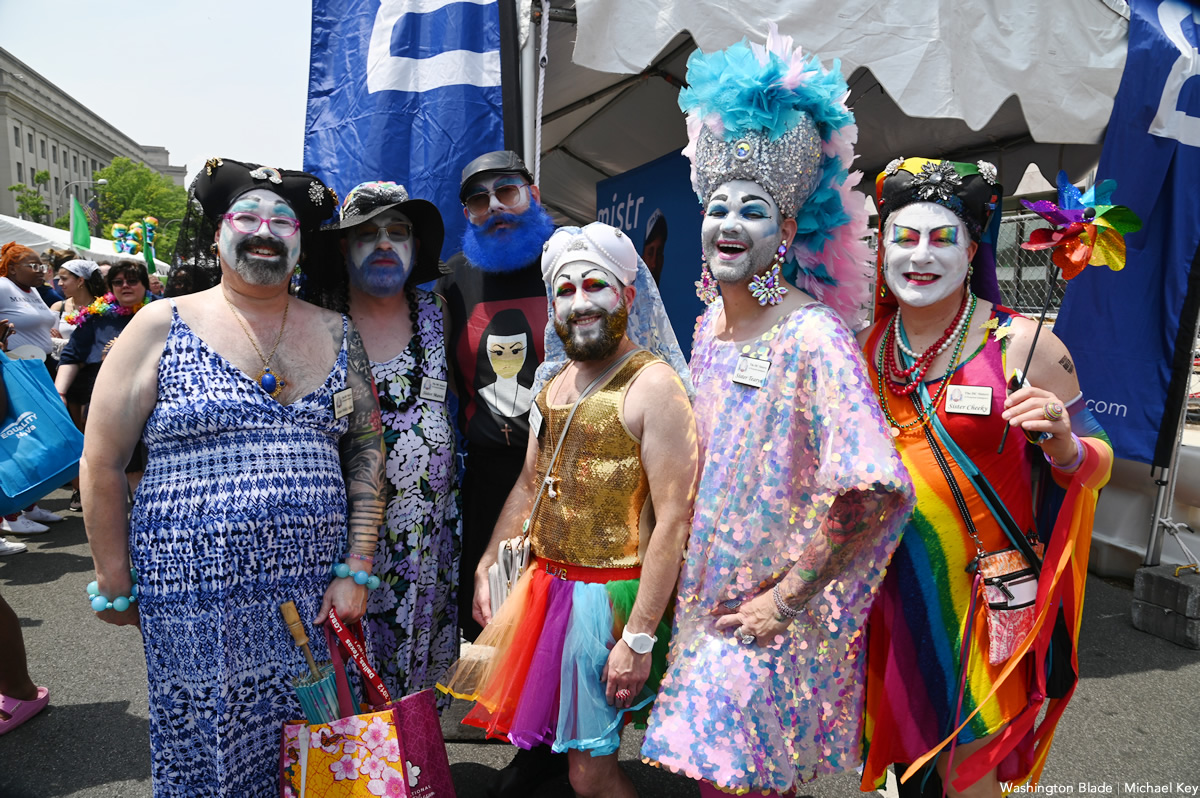
(Editor’s note: Although there has been considerable scholarship focused on LGBTQ community and advocacy in D.C., there is a deficit of scholarship focused on LGBTQ religion in the area. Religion plays an important role in LGBTQ advocacy movements, through queer-affirming ministers and communities, along with queer-phobic churches in the city. This is the final installment of a three-part series exploring the history of religion and LGBTQ advocacy in Washington, D.C. Visit our website for the previous installments.)
Six sisters gathered not so quietly in Marion Park, Washington, D.C. on Saturday, October 8, 2022. As the first sounds of the Women’s March rang out two blocks away at 11 am, the Sisters passed out candles to say Mass on the grass. It was their fifth annual Lavender Mass, but this year’s event in particular told an interesting story of religious reclamation, reimagining a meaningful ritual from an institution that seeks to devalue and oppress queer people.
The D.C. Sisters are a chapter of the Sisters of Perpetual Indulgence, an organization of “drag nuns” ministering to LGBTQ+ and other marginalized communities. What first began as satire on Easter Sunday 1979 when queer men borrowed and wore habits from a production of The Sound of Music became a national organization; the D.C. chapter came about relatively late, receiving approval from the United Nuns Privy Council in April 2016. The D.C. Sisters raise money and contribute to organizations focused on underserved communities in their area, such as Moveable Feast and Trans Lifeline, much like Anglican and Catholic women religious orders.
As Sister Ray Dee O’Active explained, “we tend to say we raise funds, fun, and hell. I love all three. Thousands of dollars for local LGBTQ groups. Pure joy at Pride parades when we greet the next generation of activists. And blatant response to homophobia and transphobia by protest after protest.” The Lavender Mass held on October 8th embodied their response to transphobia both inside and outside pro-choice groups, specifically how the overturn of Roe v. Wade in June 2022 intimately affects members of the LGBTQ+ community.
As a little history about the Mass, Sister Mary Full O’Rage, shown wearing a short red dress and crimson coronet and veil in the photo above developed the Lavender Mass as a “counterpart” or “counter narrative” to the Red Mass, a Catholic Mass held the first Sunday of October in honor Catholics in positions of civil authority, like the Supreme Court Justices. The plan was to celebrate this year’s Lavender Mas on October 1st at the Nuns of the Battlefield Memorial, located right across the street from the Cathedral of St. Matthew the Apostle, where many Supreme Court Justices attend the Red Mass every year.
As Sister Mary explained, this year “it was intended to be a direct protest of the actions of the Supreme Court, in significant measure their overturning of reproductive rights.”
Unfortunately, the October 1st event was canceled due to heavy rain and postponed to October 8th at the recommendation of Sister Ruth Lisque-Hunt and Sister Joy! Totheworld. The focus of the Women’s March this year aligned with the focus of the Lavender Mass—reproductive rights—and this cause, Sister Mary explained, “drove us to plan our Lavender Mass as a true counter-ritual and protest of the Supreme Court of who we expected to attend the Red Mass,” and who were protested in large at the Women’s March.
The “Lavender Mass was something that we could adopt for ourselves,” Sister Mary spoke about past events. The first two Masses took place at the Lutheran Church of the Reformation, right around the corner from the Supreme Court. The second Mass, as Sister Mary explained, celebrated Justice Ruth Bader Ginsburg; “we canonized her.” Canonization of saints in the Catholic Church also takes place during a Mass, a Papal Mass in particular.
During the COVID-19 pandemic, the Sisters moved the Mass outside for safety, and the third and fourth Masses were celebrated at the Nuns of the Battlefield Memorial. “It celebrates nuns, and we are nuns, psycho-clown nuns,” Sister Mary chuckled, “but we are nuns.” After the Mass, the Sisters would gather at a LGBTQ+ safe space or protest at the Catholic Church or Supreme Court. Although they often serve as “sister security” at local events, working to keep queer community members safe according to Sister Amore Fagellare, the Lavender Mass is not widely publicly advertised, out of concern for their own.
On October 8th, nine people gathered on the grass in a circle—six sisters, myself, and two people who were close with professed members—as Sister Mary called us to assemble before leading us all in chanting the chorus to Sister Sledge’s 1979 classic song “We Are Family.”
Next, novice Sister Sybil Liberties set a sacred space, whereby Sister Ruth and Sister Tearyn Upinjustice walked in a circle behind us, unspooling pink and blue ribbons to tie us together as a group. As Sister Sybil explained, “we surround this sacred space in protection and sanctify it with color,” pink for the choice to become a parent and blue for the freedom to choose not to be a parent but also as Sybil elaboration, in recognition of “the broad gender spectrum of people with the ability to become pregnant.” This intentional act was sought to fight transphobia within the fight for reproductive rights.
After singing Lesley Gore’s 1963 song “You Don’t Own Me,” six speakers began the ritual for reproductive rights. Holding out our wax plastic candles, Sister Sybil explained that each speaker would describe a story or reality connected to reproductive rights, and “as I light a series of candles for the different paths we have taken, if you recognize yourself in one of these prayers, I invite you to put your hand over your heart, wherever you are, and know that you are not alone – there is someone else in this gathered community holding their hand over their heart too.”
The Sisters went around the circle lighting a candle for those whose stories include the choice to end a pregnancy; those whose include the unwanted loss of a pregnancy or struggles with fertility; those whose include the choice to give birth, raise or adopt a child; those whose include the choice not to conceive a child, to undergo forced choice, or with no choice at all; those who have encountered violence where there “should have been tenderness and care;” and those whose reproductive stories are still being written today.
After each reading, the group spoke together, “may the beginnings and endings in our stories be held in unconditional love and acceptance,” recalling the Prayer of the Faithful or General Intercessions at Catholic Masswhere congregations respond “Lord, hear our prayer” to each petition. Sister Sybil closed out the ritual as Sister Mary cut the blue and pink ribbons between each person, creating small segments they could take away with them and tie to their garments before walking to the Women’s March. The Sisters gathered their signs, drums, and horns before walking to Folger Park together into the crowd of protestors.
At first glance, the Lavender Mass may appear like religious appropriation, just as the Sisters themselves sometimes look to outsiders. They model themselves after Angelican and Catholic women religious, in dress—they actively refer to their clothing as “habits,” their organization—members must also go through aspirant, postulant, and novice stages to be fully professed and they maintain a hierarchical authority, and in action. Like white and black habits, the Sisters all wear white faces to create a unified image and colorful coronets, varying veil color based on professed stage. Sister Allie Lewya explained at their September 2022 meeting, “something about the veils gives us a lot of authority that is undue,” but as the Sisters reinforced at the Women’s March, they are not cosplayers nor customers, rather committed clergy.
As such, the Sisters see their existence within the liminal spaces between satire, appropriation, and reimagination, instead reclaiming the basis of religious rituals to counter the power holders of this tradition, namely, to counter the Catholic Church and how it celebrates those in positions of authority who restrict reproductive rights. Similarly, the Lavender Mass is modeled after a Catholic or Anglican Mass. It has an intention, namely reproductive rights, a call to assemble, setting of a sacred space, song, chant, and prayer requests. It even uses religious terminology; each section of the Mass is ended with a “may it be/Amen/Awen/Ashay/aho.”
While this ritual—the Lavender Mass—appropriates a religious ritual of the Catholic Church and Anglican Church, this religious appropriation is necessitated by exclusion and queerphobia. As David Ford explains in Queer Psychology, many queer individuals retain a strong connection to their faith communities even though they have experienced trauma from these same communities. Jodi O’Brien builds on this, characterizing Christian religious institutions as spaces of personal meaning making and oppression. This essay further argues that the fact this ritual is adopted and reimagined by a community that the dominant ritual holder—the Catholic Church—oppressed and marginalized, means that it is not religious appropriation at all.
Religious appropriation, as highlighted in Liz Bucar’s recent book, Stealing My Religion (2022), is the acquisition or use of religious traditions, rituals, or objects without a full understanding of the community for which they hold meaning. The Sisters, however, fully understand the implications of calling themselves sisters and the connotations of performing a ritual they call a “Mass” as women religious, a group that do not have this authority in the Catholic Church. It is the reclamation of a tradition that the Sisters of Perpetual Indulgence understand because some were or are part of the Catholic Church.
Some sisters still seek out spiritual meaning, but all also recognize that the Catholic Church itself is an institution that hinders their sisters’ access and actively spreads homophobia and transphobia to this day. As such, through the Lavender Mass, the sisters have reclaimed the Mass as a tool of rebellion in support of queer identity.
Just as the Sisters recognize the meaning and power of the ritual of a Mass, along with the connotations of being a sister, the Lavender Mass fulfilled its purpose as a ritual of intention just as the Sisters fulfill public servants. “As a sister,” Sister Ruth dissected, “as someone who identifies as a drag nun, it perplexes people, but when you get the nitty gritty, we serve a similar purpose, to heal a community, to provide support to a community, to love a community that has not been loved historically in the ways that it should be loved.
The Sisters’ intentionality in recognizing and upholding the role of a woman religious in their work has been well documented as a serious parody for the intention of queer activism by Melissa Wilcox. The Lavender Mass is a form of serious parody, as Wilcox posits in the book: Queer Nuns: Religion, Activism, and Serious Parody(2018). The Mass both challenges the queerphobia of the Catholic Church while also reinforcing the legitimacy of this ritual as a Mass. The Sisters argue that although they would traditionally be excluded from religious leadership in the Catholic Church, they can perform a Mass. In doing so, they challenge the role that women religious play in the Catholic Church as a whole and the power dynamics that exclude queer communities from living authentically within the Church.
By reclaiming a tradition from a religious institution that actively excludes and traumatizes the LGBTQ+ community, the Lavender Mass is a form of religious reclamation in which an oppressed community cultivates queer religious meaning, reclaims a tradition from which they are excluded, and uses it to fuel queer activism (the fight for reproductive rights). This essay argues that the Lavender Mass goes one step further than serious parody. While the Sisters employ serious parody in their religious and activist roles, the Lavender Mass is the active reclamation of a religious tradition for both spiritual and activist ends.
Using the celebration of the Mass as it was intended, just within a different lens for a different purpose, this essay argues, is religious reclamation. As a collection of Austrian and Aotearoan scholars explored most recently in a chapter on acculturation and decolonization, reclamation is associated with the reassertion and ownership of tangibles: of rituals, traditions, objects, and land. The meaning of the Lavender Mass comes not only from the Sisters’ understanding of women religious as a social and religious role but rather from the reclamation of a physical ritual—a Mass—that has specific religious or spiritual meaning for the Sisters.
When asked why it was important to call this ritual a “Mass,” Sister Mary explained: “I think we wanted to have something that denoted a ritual, that was for those who know, that the name signifies that it was a counter-protest. And you know, many of the sisters grew up with faith, not all of them Catholics but some, so I think ‘Mass’ was a name that resonated for many of us.”
As Sister Ray said, “my faith as a queer person tends to ostracize me but the Sisters bring the imagery and language of faith right into the middle of the LGBTQ world.” This Lavender Mass, although only attended and experienced by a few of the Women’s March protests, lived up to its goal as “a form of protest that is hopefully very loud,” as Sister Millie Taint advertised in the Sisters’ September 2022 chapter meeting. It brought religious imagery and language of faith to a march for reproductive rights, using a recognized model of ritual to empower protestors.
The Lavender Mass this year, as always, was an act of rebellion, but by situating itself before the Women’s March and focusing its intention for reproductive rights, the Sisters’ reclaimed a religious ritual from a system of authority which actively oppressed LGBTQ+ peoples and those with the ability to become pregnant, namely the Catholic Church, and for harnessing it for personal, political, and spiritual power. In essence, it modelled a system of religious reclamation, by which a marginalized community takes up a religious ritual to make its own meaning and oppose the religious institution that seeks to exclude the community from ritual participation.
Emma Cieslik will be presenting on LGBTQ+ Religion in the Capital at the DC History Conference on Friday, April 6th. She is working with a DC History Fellow to establish a roundtable committed to recording and preserving this vital history. If you have any information about these histories, please reach out to Emma Cieslik at [email protected] or the Rainbow History Project at [email protected].
-

 District of Columbia2 days ago
District of Columbia2 days agoReenactment of first gay rights picket at White House draws interest of tourists
-

 District of Columbia2 days ago
District of Columbia2 days agoNew D.C. LGBTQ+ bar Crush set to open April 19
-

 Arizona2 days ago
Arizona2 days agoAriz. governor vetoes anti-transgender, Ten Commandments bill
-

 Africa4 days ago
Africa4 days agoUgandan activists appeal ruling that upheld Anti-Homosexuality Act

